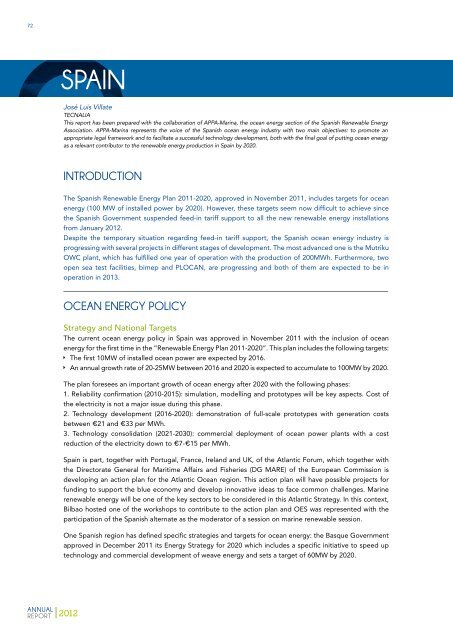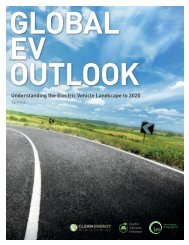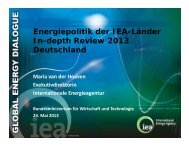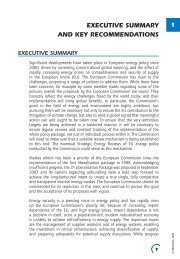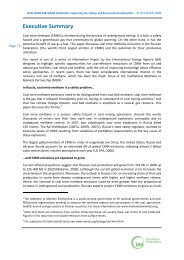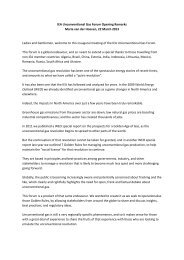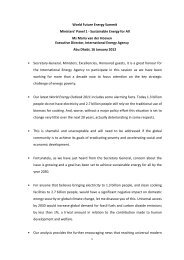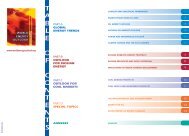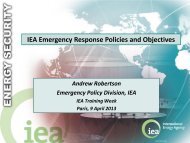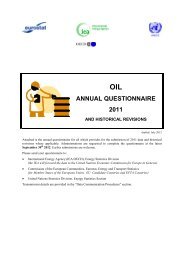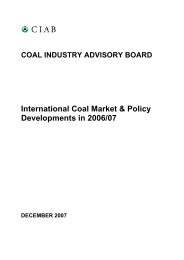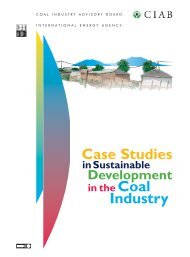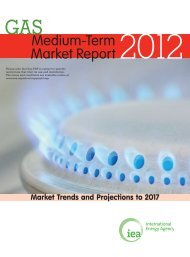OES Annual Report 2012 - Ocean Energy Systems
OES Annual Report 2012 - Ocean Energy Systems
OES Annual Report 2012 - Ocean Energy Systems
You also want an ePaper? Increase the reach of your titles
YUMPU automatically turns print PDFs into web optimized ePapers that Google loves.
72<br />
SPAIN<br />
José Luis Villate<br />
TECNALIA<br />
This report has been prepared with the collaboration of APPA-Marina, the ocean energy section of the Spanish Renewable <strong>Energy</strong><br />
Association. APPA-Marina represents the voice of the Spanish ocean energy industry with two main objectives: to promote an<br />
appropriate legal framework and to facilitate a successful technology development, both with the final goal of putting ocean energy<br />
as a relevant contributor to the renewable energy production in Spain by 2020.<br />
INTRODUCTION<br />
The Spanish Renewable <strong>Energy</strong> Plan 2011-2020, approved in November 2011, includes targets for ocean<br />
energy (100 MW of installed power by 2020). However, these targets seem now difficult to achieve since<br />
the Spanish Government suspended feed-in tariff support to all the new renewable energy installations<br />
from January <strong>2012</strong>.<br />
Despite the temporary situation regarding feed-in tariff support, the Spanish ocean energy industry is<br />
progressing with several projects in different stages of development. The most advanced one is the Mutriku<br />
OWC plant, which has fulfilled one year of operation with the production of 200MWh. Furthermore, two<br />
open sea test facilities, bimep and PLOCAN, are progressing and both of them are expected to be in<br />
operation in 2013.<br />
OCEAN ENERGY POLICY<br />
Strategy and National Targets<br />
The current ocean energy policy in Spain was approved in November 2011 with the inclusion of ocean<br />
energy for the first time in the “Renewable <strong>Energy</strong> Plan 2011-2020”. This plan includes the following targets:<br />
ÌÌ<br />
The first 10MW of installed ocean power are expected by 2016.<br />
ÌÌ<br />
An annual growth rate of 20-25MW between 2016 and 2020 is expected to accumulate to 100MW by 2020.<br />
The plan foresees an important growth of ocean energy after 2020 with the following phases:<br />
1. Reliability confirmation (2010-2015): simulation, modelling and prototypes will be key aspects. Cost of<br />
the electricity is not a major issue during this phase.<br />
2. Technology development (2016-2020): demonstration of full-scale prototypes with generation costs<br />
between €21 and €33 per MWh.<br />
3. Technology consolidation (2021-2030): commercial deployment of ocean power plants with a cost<br />
reduction of the electricity down to €7-€15 per MWh.<br />
Spain is part, together with Portugal, France, Ireland and UK, of the Atlantic Forum, which together with<br />
the Directorate General for Maritime Affairs and Fisheries (DG MARE) of the European Commission is<br />
developing an action plan for the Atlantic <strong>Ocean</strong> region. This action plan will have possible projects for<br />
funding to support the blue economy and develop innovative ideas to face common challenges. Marine<br />
renewable energy will be one of the key sectors to be considered in this Atlantic Strategy. In this context,<br />
Bilbao hosted one of the workshops to contribute to the action plan and <strong>OES</strong> was represented with the<br />
participation of the Spanish alternate as the moderator of a session on marine renewable session.<br />
One Spanish region has defined specific strategies and targets for ocean energy: the Basque Government<br />
approved in December 2011 its <strong>Energy</strong> Strategy for 2020 which includes a specific initiative to speed up<br />
technology and commercial development of weave energy and sets a target of 60MW by 2020.<br />
ANNUAL<br />
REPORT <strong>2012</strong>


